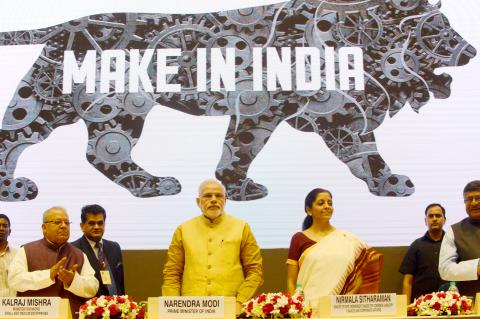Indian Prime Minister Narendra Modi yesterday pledged to slash red tape and harness the benefits of a huge young population, as he launched a campaign to attract global business to manufacture in India.
India’s business-friendly new leader wants to revive his country’s flagging economic fortunes by invigorating a manufacturing sector long eclipsed by that of neighboring China.
“We don’t need to invite the world to India; they are ready to come. We just need to give them our address,” Modi said at the launch of his “Make in India” campaign.

Photo: AFP
“India is the only country in the world that has the power of democracy, demographic dividend and demand,” he said, adding that the nation’s young people stood to benefit from manufacturing growth.
Modi’s right-wing Bharatiya Janata Party swept to power in May on a mandate to revive the economy, which is going through its worst slowdown in two decades.
The government has already relaxed rules for foreign investors, eager to create jobs for the millions of Indians who enter the employment market each year.
However, any company seeking to do business still has to contend with byzantine regulations and a stringent tax regime.
Modi said he had been “pained” to hear stories of businesses abandoning India because of an unfavorable business climate.
“I asked my staff: ‘Why are government forms so lengthy?’ And there was no reason,” Modi told business leaders, including Reliance Industries head Mukesh Ambani, India’s richest man.
Indian Minister of Commerce and Industry Nirmala Sitharaman said there was “huge untapped potential” in India for manufacturing, which accounts for just 15 percent of GDP, far less than in many other Asian nations.
“India has long been associated, unfortunately, with red-tapism and cumbersome rules and regulations. We are conscious of such perceptions,” Sitharaman said.
“We want to change that. Red tape will be replaced by the proverbial red carpet,” she said.
The World Bank recently placed India 134th among 189 economies in its ease of doing business report, while China ranked 96th.
British mobile giant Vodafone is locked in a US$2.4 billion tax row with the Indian government, while Finnish company Nokia had its plant in India seized over a tax dispute.
Kenichi Ayukawa, head of Indian car manufacturer Maruti Suzuki, said India had the potential to be a world leader in the sector, but was being held back by red tape and other issues.
“Costs of production in India increase because of various government policies, procedures, regulations and the way some of the laws are implemented,” he said at the launch, adding he was confident such barriers to growth could now be removed.
Modi launched the campaign hours before he was due to fly to the US, where he will meet heads of businesses including Google and PepsiCo on an official visit heavily focused on attracting investment.

AIR SUPPORT: The Ministry of National Defense thanked the US for the delivery, adding that it was an indicator of the White House’s commitment to the Taiwan Relations Act Deputy Minister of National Defense Po Horng-huei (柏鴻輝) and Representative to the US Alexander Yui on Friday attended a delivery ceremony for the first of Taiwan’s long-awaited 66 F-16C/D Block 70 jets at a Lockheed Martin Corp factory in Greenville, South Carolina. “We are so proud to be the global home of the F-16 and to support Taiwan’s air defense capabilities,” US Representative William Timmons wrote on X, alongside a photograph of Taiwanese and US officials at the event. The F-16C/D Block 70 jets Taiwan ordered have the same capabilities as aircraft that had been upgraded to F-16Vs. The batch of Lockheed Martin

GRIDLOCK: The National Fire Agency’s Special Search and Rescue team is on standby to travel to the countries to help out with the rescue effort A powerful earthquake rocked Myanmar and neighboring Thailand yesterday, killing at least three people in Bangkok and burying dozens when a high-rise building under construction collapsed. Footage shared on social media from Myanmar’s second-largest city showed widespread destruction, raising fears that many were trapped under the rubble or killed. The magnitude 7.7 earthquake, with an epicenter near Mandalay in Myanmar, struck at midday and was followed by a strong magnitude 6.4 aftershock. The extent of death, injury and destruction — especially in Myanmar, which is embroiled in a civil war and where information is tightly controlled at the best of times —

China's military today said it began joint army, navy and rocket force exercises around Taiwan to "serve as a stern warning and powerful deterrent against Taiwanese independence," calling President William Lai (賴清德) a "parasite." The exercises come after Lai called Beijing a "foreign hostile force" last month. More than 10 Chinese military ships approached close to Taiwan's 24 nautical mile (44.4km) contiguous zone this morning and Taiwan sent its own warships to respond, two senior Taiwanese officials said. Taiwan has not yet detected any live fire by the Chinese military so far, one of the officials said. The drills took place after US Secretary

THUGGISH BEHAVIOR: Encouraging people to report independence supporters is another intimidation tactic that threatens cross-strait peace, the state department said China setting up an online system for reporting “Taiwanese independence” advocates is an “irresponsible and reprehensible” act, a US government spokesperson said on Friday. “China’s call for private individuals to report on alleged ‘persecution or suppression’ by supposed ‘Taiwan independence henchmen and accomplices’ is irresponsible and reprehensible,” an unnamed US Department of State spokesperson told the Central News Agency in an e-mail. The move is part of Beijing’s “intimidation campaign” against Taiwan and its supporters, and is “threatening free speech around the world, destabilizing the Indo-Pacific region, and deliberately eroding the cross-strait status quo,” the spokesperson said. The Chinese Communist Party’s “threats